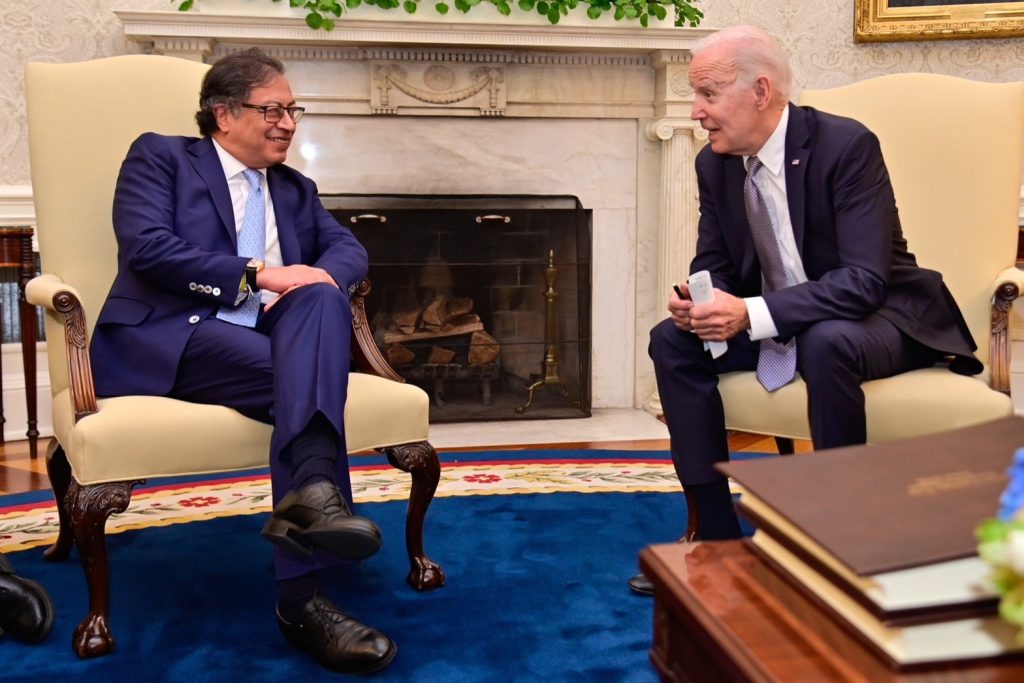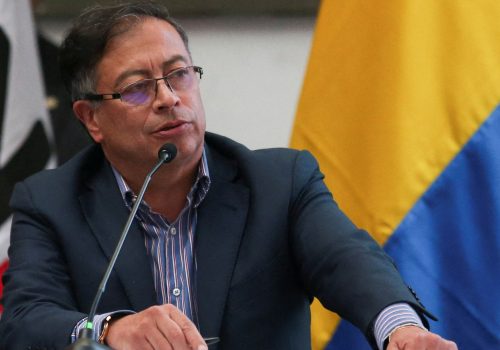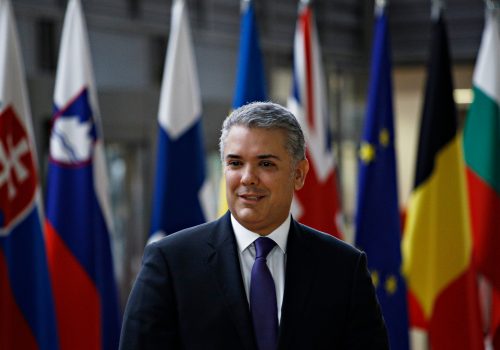“By the way, happy birthday,” US President Joe Biden wished Colombian President Gustavo Petro at the White House on Thursday. Their meeting fell a day after Petro’s sixty-third birthday and a year after both countries marked two centuries of US-Colombia relations. But it is what’s ahead, not what’s past, that was the real focus of the visit. The United States and Colombia now find themselves at odds on counternarcotics policy and a number of other issues. At the same time, addressing climate change may be an opportunity for collaboration. For a full breakdown of the visit, we put five burning questions to our Latin America experts.
1. Why does this meeting matter for the US-Colombia relationship, and what did each side come away with?
The Biden administration understands the historical importance of Petro’s presidency and recognizes the election of a progressive leader as an indication of the institutional advances made over the last twenty years. Petro should be pleased with the meeting, as he wanted to speak of his focus on decarbonizing the economy and addressing the narcotics question in a different manner. Both sides had a chance to express their views and to have them heard respectfully. That’s a success.
—Kevin Whitaker is a nonresident senior fellow at the Adrienne Arsht Latin America Center and former US ambassador to Colombia.
For the United States, this was about broadcasting the importance of the relationship with Colombia. Despite occasional disagreements with the Petro administration, the Biden administration wants to show it is willing to work with him on issues like climate change and trade while they continue to hash out thorny issues such as counternarcotics. Biden’s announcement of a five hundred million dollar commitment to the Amazon Fund is a significant gesture, which—while not limited to Colombia—suggests that the United States may engage with some of Petro’s proposals linking climate change with rainforest protection.
—Geoff Ramsey is a senior fellow at the Adrienne Arsht Latin America Center.
Thursday’s meeting advanced the longstanding ties between the United States and Colombia in a way that can only be done through a presidential visit to the White House. Biden and Petro clearly found deep common ground on combating climate change, in addition to economic development and migration. For a relationship historically centered around security and counternarcotics, the readout of Thursday’s discussion showed the importance of adding new issues such as climate change to the bilateral agenda. As with any relationship, there will be sticking points—and much concern has been raised by some US policymakers on Petro’s peace and counternarcotics plans—but the White House meeting was a win for both leaders to reinforce the extent of the common ground.
—Jason Marczak is the senior director of the Adrienne Arsht Latin America Center.
2. Did the two leaders make progress on Venezuela?
Biden and Petro spoke about Venezuela and about Colombia’s role in advancing negotiations between the Maduro government and opposition. While the Venezuelan parties have not publicly reached new agreements since announcing a major three billion dollar humanitarian accord in Mexico City in November, the process is still active. Mexico has now become a kind of clearing house for finalized agreements, not a host of technical talks—which are ongoing and quietly taking place in Caracas. When Colombia hosts an international conference on Venezuela next week, its ability to coordinate with the United States and other allies to refocus attention on negotiations will be put to the test.
—Geoff Ramsey
The public statements were certainly consonant with one another, and the photos seemed to show some chemistry between the two leaders. On Venezuela, Colombian Minister of Foreign Affairs Álvaro Leyva’s earlier comment that sanctions relief could come only after there was material progress towards free elections is consistent with the US view. Colombian leadership on Venezuela can be a welcome element in the government-opposition talks, which appear stuck. Next week’s meeting in Bogotá will be important in making clear how the Colombian government’s influence can help give the Venezuelan people a real opportunity to state their views through free elections.
—Kevin Whitaker
3. What are the tension points in the relationship, and how did we see those play out on Thursday?
The readouts were as important for what they didn’t say as what they did say. While the salience of the cocaine trade is less in the US now than in the past, thanks to the emergence of the new scourges of fentanyl and synthetic opioids, there are many stakeholders here concerned with the explosive growth of coca/cocaine coming from Colombia and the absence of a clear and executable plan for controlling it.
Separately, while both presidents seem to agree on the need to move away from hydrocarbons, the reality is that both nations’ economies and budgets are dependent on those extractive products. The US “all of the above” approach, implemented step by step, is frustrating to leaders like Petro, who advocate more dramatic steps.
—Kevin Whitaker
While we saw some signs of cooperation on climate change and US-Colombia economic ties, there is still daylight between Biden and Petro on counternarcotics. Coca cultivation and cocaine production have skyrocketed in recent years in Colombia, but in the context of this visit the leaders seem to have agreed to disagree for now. Behind the scenes there are ongoing conversations about the future of US-Colombia cooperation on drugs and security. Moving forward we’ll likely see a middle ground that incorporates US concerns while also getting at the Petro administration’s interest in addressing the root economic causes of coca cultivation in impoverished rural areas.
—Geoff Ramsey
Security policy and the counternarcotics strategy of the Petro government represent a sharp contrast from his predecessor. The challenge will be to figure out a plan moving forward that is acceptable to both sides of the aisle in Washington and that speaks to the desire of Petro and those who elected him to have a different approach to achieving the same shared goal of reducing illicit coca cultivation. Petro is speaking to the concerns of those in rural areas of Colombia who ultimately just want to improve their livelihoods and to find a sustainable, long-term path to move out of poverty.
—Jason Marczak
4. How important is this partnership in the regional context? What impact can the US-Colombia partnership have on democracy promotion?
Petro, Chilean President Gabriel Boric, and Brazilian President Luiz Inácio Lula da Silva all are presidents of the political left who struggled to achieve power through institutional means in systems they believed tilted against them. The fact that all did so, within the system, is a testament to their democratic vocation and an important message to victims of the dictatorships in Venezuela, Cuba, and Nicaragua. Relatedly, the United States hopes that these presidents, with their progressive credentials, will be able to develop persuasive arguments with the leaders of those nations to move toward greater democracy.
—Kevin Whitaker
A renewed US emphasis on democracy promotion worldwide is an opportunity for countries to showcase and deepen their democratic credentials at home. Petro came to office promising to address the needs of long-neglected Afro-Colombian and indigenous communities in areas of the country that the US Agency for International Development has worked for decades. This work is ripe for expansion given the priorities of the new Colombian government.
—Geoff Ramsey
Colombia is one of the United States’ most important regional allies and an historically reliable global partner as well. Just last year, Colombia was designated as a major non-NATO ally, becoming the third country in Latin America with that privileged status and among fewer than twenty such countries globally. That distinction was a long time coming and reflects the traditionally deep cooperation of the United States and Colombia on a broader set of issues that go beyond the bilateral relationship. Petro has an opportunity to show that the political ideology of a country’s can change, but the institutions of democracy remain strong.
—Jason Marczak
5. Do we see any hints of a policy shift from the US with regard to counternarcotics strategy in Colombia?
The United States seems to have embraced the Colombian idea of a “holistic” approach, whatever that turns out to mean, and does not appear publicly to be pressuring for more eradication, even though that tool has proven effective in Colombia in the past. Greater clarity from the Colombian government about the practical components of its Paz Total approach with respect to counternarcotics would be welcome.
National Security Council Senior Director Juan Gonzalez said that the United States is considering the request to send a special envoy to the Paz Total process. That would be a daring move given that the process is only just getting started, and given that this is an internal Colombian matter.
—Kevin Whitaker
Further reading
Wed, Jun 1, 2022
Agenda | Allies: Twenty-seven bold ideas to reimagine the US-Colombia relationship
Allies US-Colombia Book By
Agenda for June 1, 2022 event, Allies: Twenty-seven bold ideas to reimagine the US-Colombia relationship.
Fri, Aug 5, 2022
Colombia’s first leftist president is taking office. What should the US expect from him?
New Atlanticist By
We reached out to our top Latin America minds to break down what a Gustavo Petro presidency will mean for this longstanding strategic relationship.
Fri, May 6, 2022
Colombia can lead the energy transition in Latin America
EnergySource By
Colombia's geography gives it a chance to take a leadership role in Latin America's energy transition. But to do so, Colombian leaders will first need to address indigenous concerns, remove barriers to investment, and fix long-standing mismanagement issues.
Image: President Joe Biden meets with his Colombian counterpart, Gustavo Petro, at the White House.



